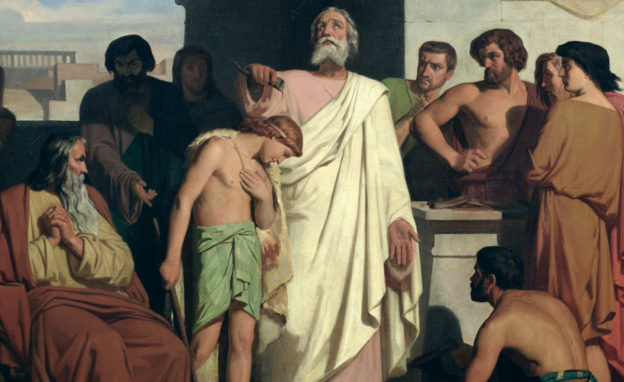Covenant is not a word that we use much these days, though the concept still exists in legal relationships involving trust and unconditional love… like marriage. While even marriages are not always honoured these days, a covenant is an extremely important bond. Especially when overseen by God.
In 1 Samuel 20, David faced the prospect that he was an enemy of Israel’s king. At the same time, while driven by fear, he was comforted by the covenant between himself and Jonathan. Jonathan’s actions show the faithfulness of a covenant keeper in this chapter. It points us to our own way to thread the needle of faithfulness to God in life with the demands of the world. But most importantly, it points us to our faithful covenant keeper, Jesus, who is faithful where we are not.
David had to flee from Saul (ch. 19). He could no longer stay in Saul’s presence, facing attempt after attempt against his life. While Saul was busy prophesying, David had time to flee Naioth (v.1). He sought out Jonathan, seeking some understanding for why Saul wanted him dead (v.1).
Jonathan was not convinced that Saul meant to kill David, believing that Saul would not keep him in the dark despite his obvious allegiance to David (v.2). David was more worldly-wise and recognised that Saul would not keep his pro-David son in the loop (v.3).
Jonathan agreed to help David however he could (v.4). David proposed a test which would show if Saul was against him or just crazed, based on his reaction to David’s absence from a monthly feast (vv.5-7). David expected Jonathan to act with love and kindness to him, as the lesser partner in their covenant, because God was their witness (v.8). If David had done wrong, Jonathan should be the one to kill him (v.8). Jonathan promised his goodwill and support (vv.9-11).
To let David know the outcome in a way which avoided dragging Jonathan openly into conflict with Saul, they agreed an arrangement to convey the outcome. Jonathan was bound to honour his covenant oath, but also his duty to his father, the king (vv.12-17). Jonathan, on the other hand, knew David would be king after Saul, so had David promise that he would not wipe his family line out to remove the competition (v.17).
So, in three days, Jonathan would shoot arrows at a stone heap. If his servant was told the arrows fell short, all was well. If they were long, then David needed to flee (vv.18-23). That way Jonathan could thread the needle.
Sure enough, it all came to pass. Jonathan sat down at the monthly feast, but David’s place was empty (vv.24-6). While Saul offered a day’s grace in case of ritual uncleanness, by the second day he noticed and asked why David was not there, Jonathan offered the pre-arranged falsehood (vv.27-9).
Jonathan was probably a bad liar. Saul saw right through. His reaction was as David expected, though. He angrily cursed his son, suggesting if Jonathan wanted the riches of kingship he should deliver up David (vv.30-31). When Jonathan questioned Saul’s motives in killing David, Saul threw his spear at his own son! So Jonathan had his answer, and withdrew from his godless father (vv.32-4).
There was only one thing left to do. Jonathan rose as agreed and went to shoot arrows. He shot arrows beyond, and added “Hurry! Be quick! Do not stay!” (v.38) Then, sending his servant back home, took the opportunity to tearfully bid farewell to his faithful friend, unjustly accused and sought by his godless father king (vv.39-42). While they would be on opposite sides of the conflict to come, they were friends who sought each other’s good, and the good of their families (v.42).
Jonathan’s example was exemplary. Jonathan was caught between two difficult situations; between his covenant before God with David, and between his duty to his father the king. David and Jonathan both sought a way to determine the truth, while attempting to uphold Jonathan’s duty to his father.
While this involved falsehood, Saul was in practice an unbeliever and acting against God’s Will. When this happens, God’s People are called to a higher obedience to God than to man. But we must be careful not to use this as an excuse to disobey rules that we dislike.
Yet we must also notice that Jonathan carefully tried to balance duty to the king to his duty to his faithful covenant brother. This is the balance we must all strive for, between faithfulness to God and the demands of daily life.
However, we must not make this passage about us. Jonathan’s faithfulness points us to Christ’s faithfulness. Jesus was faithful to us when we are not, always seeking our good and suffering the rejection of the world for us. Jesus fulfilled the Law’s demands for us, and in love gave his own life for us. We can trust in God’s covenant with us, because of God’s goodness to us in Christ.





